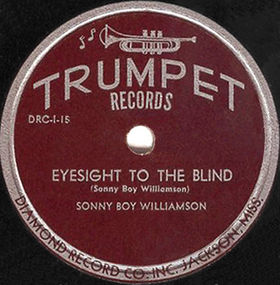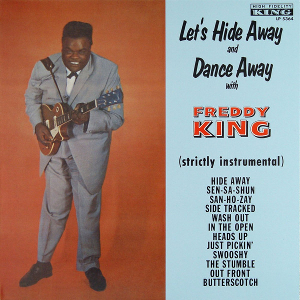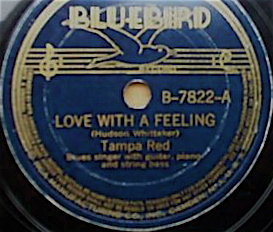Style and influence
Freddie King's guitar playing has been described as "a unique synthesis" of Texas and Chicago blues styles. According to author John Hartley Fox, "King was a Texas bluesman as well as a member of the same "West Side" school of gritty Chicago blues that produced incendiary guitarists Buddy Guy, Otis Rush, Magic Sam, and Luther Allison". [5] Freddy King Sings was released after the success of his instrument singles "Hide Away" and "San-Ho-Zay", "when King's guitar playing came to overshadow his singing, a change he never really welcomed", Fox added. [5] In 2008, the album was inducted into the Blues Foundation Hall of Fame. [4] Writing for the Foundation, blues researcher Jim O'Neal noted that the songs on Freddy King Sings show him "to be one of the most expressive blues vocalists". [4]
Freddie King was a "fundamental influence on the young guitar players", according to music writer Keith Shadwick. [6] Eric Clapton describes being profoundly affected by King's "I Love the Woman" upon first hearing it in 1963 [7] and has recorded three of the songs on Freddy King Sings ("I'm Tore Down", "You've Got to Love Her with a Feeling", and several performances of "Have You Ever Loved a Woman"). "See See Baby", "Lonesome Whistle Blues", and "I Love the Woman" have also been recorded by a variety of artists. Chicken Shack recorded both "See See Baby" and "Lonesome Whistle Blues" on their debut album 40 Blue Fingers, Freshly Packed and Ready to Serve , in 1968.

Mathis James Reed was an American blues musician and songwriter. His particular style of electric blues was popular with blues as well as non-blues audiences. Reed's songs such as "Honest I Do" (1957), "Baby What You Want Me to Do" (1960), "Big Boss Man" (1961), and "Bright Lights, Big City" (1961) appeared on both Billboard magazine's rhythm and blues and Hot 100 singles charts.

Having a Rave Up with the Yardbirds, or simply Having a Rave Up, is the second American album by English rock group the Yardbirds. It was released in November 1965, eight months after Jeff Beck replaced Eric Clapton on guitar. It includes songs with both guitarists and reflects the group's blues rock roots and their early experimentations with psychedelic and hard rock. The title refers to the driving "rave up" arrangement the band used in several of their songs.
"Little Wing" is a song written by Jimi Hendrix and recorded by the Jimi Hendrix Experience in 1967. It is a slower tempo, rhythm and blues-inspired ballad featuring Hendrix's vocal and guitar with recording studio effects accompanied by bass, drums, and glockenspiel. Lyrically, it is one of several of his songs that reference an idealized feminine or guardian angel-like figure. At about two and a half minutes in length, it is one of his most concise and melodically focused pieces.

Freddie King was an American blues guitarist, singer and songwriter. He is considered one of the "Three Kings of the Blues Guitar". Mostly known for his soulful and powerful voice and distinctive guitar playing, King had a major influence on electric blues music and on many later blues guitarists.

"You Shook Me" is a 1962 blues song recorded by Chicago blues artist Muddy Waters. Willie Dixon wrote the lyrics and Earl Hooker provided the instrumental backing; the song features Waters' vocal in unison with Hooker's slide-guitar melody. "You Shook Me" became one of Muddy Waters' most successful early-1960s singles and has been interpreted by several blues and rock artists.

"Eyesight to the Blind" is a 12-bar blues song written and recorded in 1951 by Sonny Boy Williamson II. He also recorded the related songs "Born Blind", "Unseeing Eye", "Don't Lose Your Eye", and "Unseen Eye" during his career. The Larks, an American rhythm and blues group, recorded the song, which reached number five on the R&B charts in 1951. Several musicians subsequently recorded it in a variety of styles. The Who used Williamson's lyrics for their adaptation for the rock opera Tommy.

"Goin' Down Slow" or "Going Down Slow" is a blues song composed by American blues singer St. Louis Jimmy Oden. It is considered a blues standard and "one of the most famous blues of all".

"Spoonful" is a blues song written by Willie Dixon and first recorded in 1960 by Howlin' Wolf. Called "a stark and haunting work", it is one of Dixon's best known and most interpreted songs. Etta James and Harvey Fuqua had a pop and R&B record chart hit with their duet cover of "Spoonful" in 1961, and it was popularized in the late 1960s by the British rock group Cream.
William Myles Nobles, known as Billy Myles, was an American R&B songwriter and singer active in the 1950s and 1960s. He is best known for writing "Tonight, Tonight" recorded by The Mello-Kings, "(You Were Made for) All My Love" recorded by Jackie Wilson (1960), and "Have You Ever Loved A Woman" recorded by Freddie King (1960), then Eric Clapton (1970).
"Have You Ever Loved a Woman" is a blues song written by Billy Myles and first recorded by American blues artist Freddie King in 1960. The song is performed as a slow 12-bar blues with King's vocal and guitar accompanied by a small combo of pianist Sonny Thompson, bassist Bill Willis, and drummer Phillip Paul.
"Wang Dang Doodle" is a blues song written by Willie Dixon. Music critic Mike Rowe calls it a party song in an urban style with its massive, rolling, exciting beat. It was first recorded by Howlin' Wolf in 1960 and released by Chess Records in 1961. In 1965, Dixon and Leonard Chess persuaded Koko Taylor to record it for Checker Records, a Chess subsidiary. Taylor's rendition quickly became a hit, reaching number thirteen on the Billboard R&B chart and number 58 on the pop chart. "Wang Dang Doodle" became a blues standard and has been recorded by various artists.

"Hide Away" or "Hideaway" is a blues guitar instrumental that has become "a standard for countless blues and rock musicians performing today". First recorded in 1960 by Freddie King, the song became a hit on the record charts. It has been interpreted and recorded by numerous blues and other musicians and has been recognized by the Rock and Roll Hall of Fame and the Grammy Hall of Fame.

"Worried Life Blues" is a blues standard and one of the most recorded blues songs of all time. Originally recorded by Big Maceo Merriweather in 1941, "Worried Life Blues" was an early blues hit and Maceo's most recognized song. An earlier song inspired it and several artists have had record chart successes with their interpretations of the song.

Let's Hide Away and Dance Away with Freddy King is a 1961 instrumental album by blues guitarist and singer Freddie King. Released on King Records, the album contained a number of influential songs and two hit singles, "Hide Away" and "San-Ho-Zay". The former reached number five on the Billboard Hot R&B chart and number 29 on the broader Hot 100 chart, while the latter reached numbers four and 47. The album, itself influential, has been critically well received.

"3 O'Clock Blues" or "Three O'Clock Blues" is a slow twelve-bar blues recorded by Lowell Fulson in 1946. When it was released in 1948, it became Fulson's first hit. When B.B. King recorded the song in 1951, it became his first hit as well as one of the best-selling R&B singles in 1952.

"Reconsider Baby" is a blues song written and recorded by Lowell Fulson in 1954. Performed in the West Coast blues style, it was Fulson's first record chart hit for Checker Records, a subsidiary of Chess Records. With memorable lyrics and a driving rhythm, "Reconsider Baby" became a blues standard and has been recognized by the Blues Foundation and Rock and Roll Halls of Fame.

"Farther Up the Road" or "Further On up the Road" is a blues song first recorded in 1957 by Bobby "Blue" Bland. It is an early influential Texas shuffle and features guitar playing that represents the transition from the 1940s blues style to the 1960s blues-rock style.

"You've Got to Love Her with a Feeling", or "Love with a Feeling" as it was originally titled, is a blues song first recorded by Tampa Red in 1938. Numerous blues artists have interpreted and recorded the song, making it a blues standard. When Freddie King adapted it in 1961, it became his first single to appear in the record charts.

40 Blue Fingers, Freshly Packed and Ready to Serve is the debut studio album by the blues band Chicken Shack, released in 1968. The album reached number 12 in the UK Albums Chart.
"I'm Tore Down" or "Tore Down" is a blues song first recorded in 1961 by Freddie King for Federal Records. Pianist Sonny Thompson, who played on several early King songs, is credited as the songwriter. When Federal released it as single in 1961, with the instrumental "Sen-Sa-Shun" as the B-side, it reached number five on Billboard's Hot R&B Sides singles chart.















